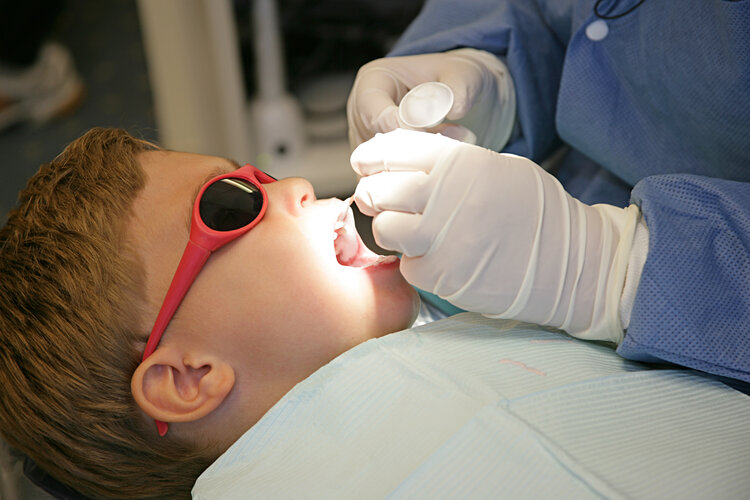Fluoride
Fluoride treatment strengthens enamel, the outer surface of your teeth.

Table of Contents
We recommend supplementing with fluoride, especially for children. Since adding fluoride to public drinking water, there’s been a dramatic reduction in cavities. When taken as prescribed, it is not only safe but vital for healthy teeth.
Fluoride is all-natural! It is actually a mineral found in water, soil, and plants.
Fluoride strengthens tooth enamel, repairs demineralized areas by adding calcium back into the tooth, and makes enamel more resistant to decay and the acids and plaque that cause decay.
Topical fluorides are applied to the outside of your teeth like toothpaste and fluoride mouth rinses. Topical fluoride, like in toothpaste, helps make the teeth harder and more resistant to decay from the outside of the tooth. Read the label on your toothpaste and be sure it contains fluoride and is ADA approved.
Fluoride varnish, gel, or foam applied in your dental office is another topical fluoride that contains more than your toothpaste or mouth rinse can provide. Children wearing orthodontic braces and appliances should use fluoride more frequently to prevent cavities when thorough brushing is more difficult. In addition to fluoride treatments at dental visits, orthodontic patients should also be using fluoride rinse or prescription toothpaste or rinse with higher levels at home.
Patients undergoing chemo or radiation therapy need more topical fluoride in the form of trays to be worn at home to prevent cavities during treatment. Our team will fabricate custom trays for home use for patients who need additional fluoride treatments that will be done at home.
Systemic fluoride (any fluoride that is swallowed) in foods, water, and supplements benefits your teeth working from the inside out to ensure strong enamel.
Drinking water and fluoride
When fluoride is present in drinking water, it helps children with developing teeth. If your family has well water, always have your water tested for fluoride levels before giving supplements to your children. Some wells have sufficient fluoride, and supplements are not needed. As of 2018, 73.0% of the US population on community water systems, or 207,426,535 people, had access to fluoridated water. Check with your town to see if your water contains fluoride.
Should Fluoride Be Present in Drinking Water?
When fluoride is present in drinking water, it helps children with developing teeth. If your family has well water, always have your water tested for fluoride levels before giving fluoride supplements to your children. Some wells have sufficient fluoride, and supplements are not needed. As of 2018, 73.0% of the US population on community water systems, or 207,426,535 people, had access to fluoridated water. Check with your town to see if your water contains fluoride.
Fluoride FAQs
Children need fluoride primarily for its role in dental health. It strengthens tooth enamel, increasing its resistance to acid production by oral bacteria that causes decay. It also aids in remineralizing areas of teeth that have begun to decay, potentially reversing the early stages of tooth decay. Regular exposure, whether through drinking fluoridated water, using fluoride toothpaste, or receiving professional fluoride treatments, can significantly lower the risk of cavities in children and promote overall oral health.
The amount of fluoride a child needs depends on various factors, including age, risk of tooth decay, and exposure from other sources like water and dental products. Generally, children between 6 months and 16 years old benefit from fluoride intake to support dental health. The American Dental Association recommends using fluoride toothpaste with a concentration of 1,000-1,500 parts per million (ppm) for children under 3 and 1,350-1,500 ppm for children aged 3-6.
For children living in areas without fluoridated water, supplements may be recommended by a dentist or pediatrician to ensure adequate fluoride intake. It’s important to consult with a healthcare professional to determine the appropriate regimen for your child.
Fluoride helps prevent tooth decay by strengthening tooth enamel and making it more resistant to acid attacks from bacteria in the mouth. When present, it can be incorporated into the enamel structure, forming a more potent compound called fluorapatite. This strengthened enamel is less prone to demineralization and can even promote remineralization of early signs of decay, effectively reducing the risk of cavities. Additionally, fluoride can inhibit the growth of harmful bacteria in the mouth, further contributing to improved dental health and cavity prevention.
